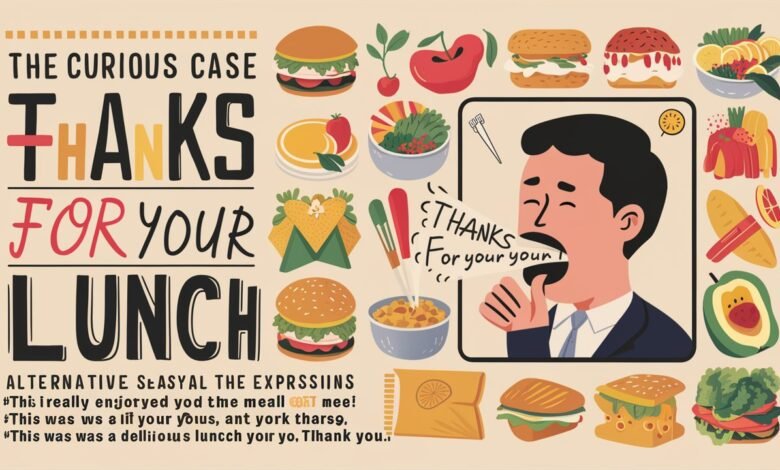The Curious Case of “Thanks for Your Lunch”: Why This Phrase Sticks in Our Throats (And What to Say Instead)

Introduction
Language is a fascinating tapestry woven with threads of meaning, context, and unspoken social rules. Sometimes, a seemingly simple phrase can trip us up, leaving us feeling awkward or uncertain. Few phrases encapsulate this peculiar social friction quite like “Thanks for your lunch.” On the surface, it appears straightforward – an expression of gratitude for sustenance provided. Yet, uttering it often feels jarringly out of place, conjuring images of playground swaps or transactional exchanges that feel alien to adult interactions. Why does this particular combination of words cause such discomfort? What hidden social dynamics does it reveal about how we express gratitude, navigate reciprocity, and perceive ownership? This article delves into the linguistic and social nuances of “Thanks for your lunch,” exploring why it grates, when it might awkwardly fit, the far superior alternatives available, and the profound importance of expressing appreciation in ways that resonate authentically within our complex social fabric. Understanding this small phrase unlocks a broader appreciation for the delicate dance of human connection and the power of choosing our words wisely.
The Awkwardness Explained: Why “Thanks for Your Lunch” Feels Wrong
The profound awkwardness elicited by “Thanks for your lunch” stems from a fundamental clash between the phrase’s literal meaning and the complex social contracts governing food, ownership, and gratitude in adult relationships. In most non-familial adult contexts, lunch is perceived as a deeply personal possession. We select it based on preference, dietary needs, and often, financial consideration. To say “your lunch” explicitly highlights this individual ownership in a way that feels unnecessarily pointed and slightly invasive. It draws stark attention to the fact that the item being thanked for was unequivocally theirs, not a shared resource or a casual offering. Furthermore, the phrase inherently implies a direct, almost one-to-one transfer of possession that rarely occurs naturally between peers. Adults typically don’t hand over their entire, untouched lunch to a colleague; they might share a bite, offer something they brought extra, or treat someone by buying them their own meal. “Thanks for your lunch” fails to capture the nuance of sharing, generosity, or treating. Instead, it reduces the interaction to a simplistic, almost childlike model of possession transfer (“You had it, now I have it, thanks”), which feels jarringly out of step with the subtler exchanges of adult life. It inadvertently frames the giver as having sacrificed their own sustenance, potentially inducing unnecessary guilt or highlighting a perceived imbalance in a way that more gracious phrases avoid.
Context is King: When “Thanks for Your Lunch” Might (Barely) Fit
While overwhelmingly awkward, the harsh glare of social context can, in very specific and limited scenarios, soften the inappropriateness of “Thanks for your lunch” to a faint, residual cringe. The most plausible situation involves explicit, pre-arranged sharing between individuals with a very established, easy-going rapport, perhaps close colleagues or friends who routinely swap portions of their home-cooked meals. If Person A directly says, “Hey, I made extra curry today, want half of my lunch?” and Person B accepts that specific half, then a mumbled “Thanks for your lunch” might pass without major social repercussion, though “Thanks, this curry is amazing!” remains vastly superior. Similarly, in the highly unusual event where someone genuinely gifts their entire, untouched packed lunch to another person – perhaps they unexpectedly have to leave and insist a colleague takes it – the phrase could be used literally, though “Thanks for the lunch, that’s really kind” still sounds more natural. Crucially, these scenarios involve a clear, direct transfer of the specific lunch item itself, not a treat or a bought meal. Even then, the phrase retains an inherent clumsiness. Using it when someone simply shares a bite (“Try my sandwich!”) or, far worse, when someone buys you your own lunch (“Lunch is on me today!”) catapults it firmly back into deeply uncomfortable territory. In the latter case, “Thanks for your lunch” is catastrophically incorrect, implying they handed over their own meal rather than purchasing one specifically for you.
Beyond the Cringe: Powerful Alternatives for Expressing Lunchtime Gratitude
Fortunately, the English language offers a rich palette of expressions far more adept at conveying lunchtime appreciation gracefully and appropriately, eliminating the need to ever force “Thanks for your lunch.” The key lies in focusing on the act of generosity, the specific item enjoyed, or the experience provided, rather than awkwardly referencing the ownership of the lunch itself. When someone shares a portion of their food, a warm “This is delicious, thanks for sharing!” or “Wow, thanks for the taste, that’s amazing!” acknowledges their kindness and the food itself. If someone treats you by buying your meal, the clear and direct “Thank you so much for lunch!” or “That was incredibly kind of you, thanks for treating me!” hits the perfect note, focusing on their generous action. For a simple shared snack or offered item, “Thanks, that hit the spot!” or “Appreciate you sharing your cookies!” suffices. Adding specificity enhances sincerity: “Thank you for the sandwich, it was fantastic!” or “This coffee was exactly what I needed, thanks so much!” These alternatives accomplish several crucial things: they clearly express gratitude, they accurately reflect the nature of the gesture (sharing, treating, offering), they avoid the uncomfortable spotlight on the giver’s personal possession, and they sound natural and socially fluent. They build rapport instead of creating a micro-moment of social friction.
The Deeper Significance: Food, Sharing, and Social Bonds
The discomfort around “Thanks for your lunch” points to a much larger truth: sharing food is a profoundly significant social ritual laden with meaning, extending far beyond mere caloric intake. Across cultures and throughout history, breaking bread together symbolizes trust, camaraderie, goodwill, and the strengthening of social bonds. When we offer someone food, we are extending a piece of our own resources, our time (in preparation or purchase), and our care. To share food is an act of vulnerability and connection. Acknowledging this gesture appropriately is not mere politeness; it’s an essential part of the reciprocal dance that maintains social harmony. Using a phrase like “Thanks for your lunch,” with its transactional and possessive undertones, can feel like it cheapens this deeper significance. It reduces a potential moment of connection to a simple exchange of goods, failing to honor the symbolic weight of the act. Choosing the right words of thanks – words that recognize the generosity, the thoughtfulness, or the pleasure derived – reinforces the positive social connection. It shows you understand and appreciate not just the food, but the intention and the relationship behind the offering. In this way, navigating the simple act of thanking someone for food becomes a microcosm of navigating social relationships with awareness and grace.
Cultural Nuances and Generosity
The perception of “Thanks for your lunch” and the preferred alternatives can also be subtly influenced by cultural context, particularly concerning norms around generosity, reciprocity, and directness. In cultures where explicit verbal gratitude is highly emphasized or where acknowledging the specific value of a gift is important, phrases like “Thank you for the meal” or “I really appreciate you buying me lunch” might be commonplace and expected, feeling perfectly natural and not at all transactional. Conversely, in cultures where excessive verbal thanks might be seen as creating obligation or imbalance, a simple appreciative nod or a more understated “That was lovely, cheers” might be preferred over effusive declarations, though “Thanks for your lunch” would likely still jar. The core issue often transcends culture: the phrase’s inherent implication that you are thanking someone for relinquishing their own specific, personal meal. This directness regarding possession tends to be uncomfortable across many cultural boundaries when applied to a personal item like lunch in casual peer settings. The universality lies in the fundamental human understanding that sharing food is an act of goodwill. The most adaptable approach is to focus on the generosity of the act (“Thanks for sharing,” “That was so generous”) or the enjoyment of the food itself (“This is delicious, thank you”), which generally aligns with positive social expectations across diverse contexts. Understanding these nuances helps ensure our gratitude lands as intended, fostering connection rather than confusion.
Conclusion
“Thanks for your lunch” stands as a fascinating linguistic oddity – a phrase that, while grammatically sound, consistently fails the test of social fluency. Its awkwardness serves as a reminder that language is not merely about dictionary definitions but about navigating the intricate web of human relationships, expectations, and unspoken rules. The discomfort arises because it misrepresents the typical nature of adult food sharing, overly emphasizes personal possession, and fails to capture the essence of generosity inherent in treating or sharing. Thankfully, we are not linguistically impoverished; a wealth of clear, gracious, and contextually appropriate alternatives exist to express our genuine appreciation for lunchtime kindness. Choosing phrases like “Thank you for lunch!”, “Thanks for sharing, this is great!”, or “That was incredibly kind of you!” allows us to acknowledge the gesture accurately and warmly, reinforcing the positive social bond rather than creating a moment of friction. Ultimately, moving beyond the cringe of “Thanks for your lunch” is about more than just avoiding an awkward phrase; it’s about honing our ability to express gratitude in ways that are authentic, respectful, and conducive to building stronger, more meaningful connections over every shared meal.
Frequently Asked Questions (FAQs)
Q1: Is “Thanks for your lunch” EVER acceptable?
A1: It’s extremely rare and generally awkward. The only conceivable scenario is if someone literally hands you their entire, untouched packed lunch (e.g., “I have to leave, please take my lunchbox”). Even then, “Thanks for the lunch” or “That’s really kind, thanks” sounds more natural. It is never appropriate if someone shares part of their lunch, buys you your own lunch, or treats you to a meal out.
Q2: What’s the BIGGEST mistake people make with this phrase?
A2: The most common and egregious error is using “Thanks for your lunch” when someone has actually bought you your own meal. This fundamentally misrepresents the gesture. You are thanking them for treating you or buying you lunch, not for giving you their specific lunch. Saying “your lunch” in this context is nonsensical and highlights a misunderstanding of what actually occurred.
Q3: Why does “Thanks for lunch!” sound fine, but “Thanks for YOUR lunch!” sounds so weird?
A3: The crucial difference is the possessive pronoun “your.” “Thanks for lunch!” focuses generically on the meal you received and the act of providing it. “Thanks for your lunch” explicitly and unnecessarily highlights that the lunch belonged specifically to the other person, emphasizing ownership in a way that feels intrusive and transactional in the context of sharing or treating.
Q4: What should I say if someone just shares a bite or a snack?
A4: Keep it simple and appreciative! Focus on the sharing act or the item itself:
- “Thanks for sharing!”
- “That’s delicious, thanks for the taste!”
- “Ooh, thanks! I appreciate it.”
- “Thanks for the [cookie/sandwich bite/etc.]!”
Q5: Does this mean I shouldn’t express gratitude for shared food?
A5: Absolutely not! Expressing gratitude is essential. The point is to choose the phrasing that accurately and gracefully reflects the situation. Acknowledge the generosity (“Thanks for sharing,” “That’s so kind”), the treat (“Thank you for lunch!”), or the specific item (“This cake is amazing, thanks!”). Avoid the clunky and possessively-focused “Thanks for your lunch.” Genuine appreciation, correctly phrased, always strengthens bonds.



